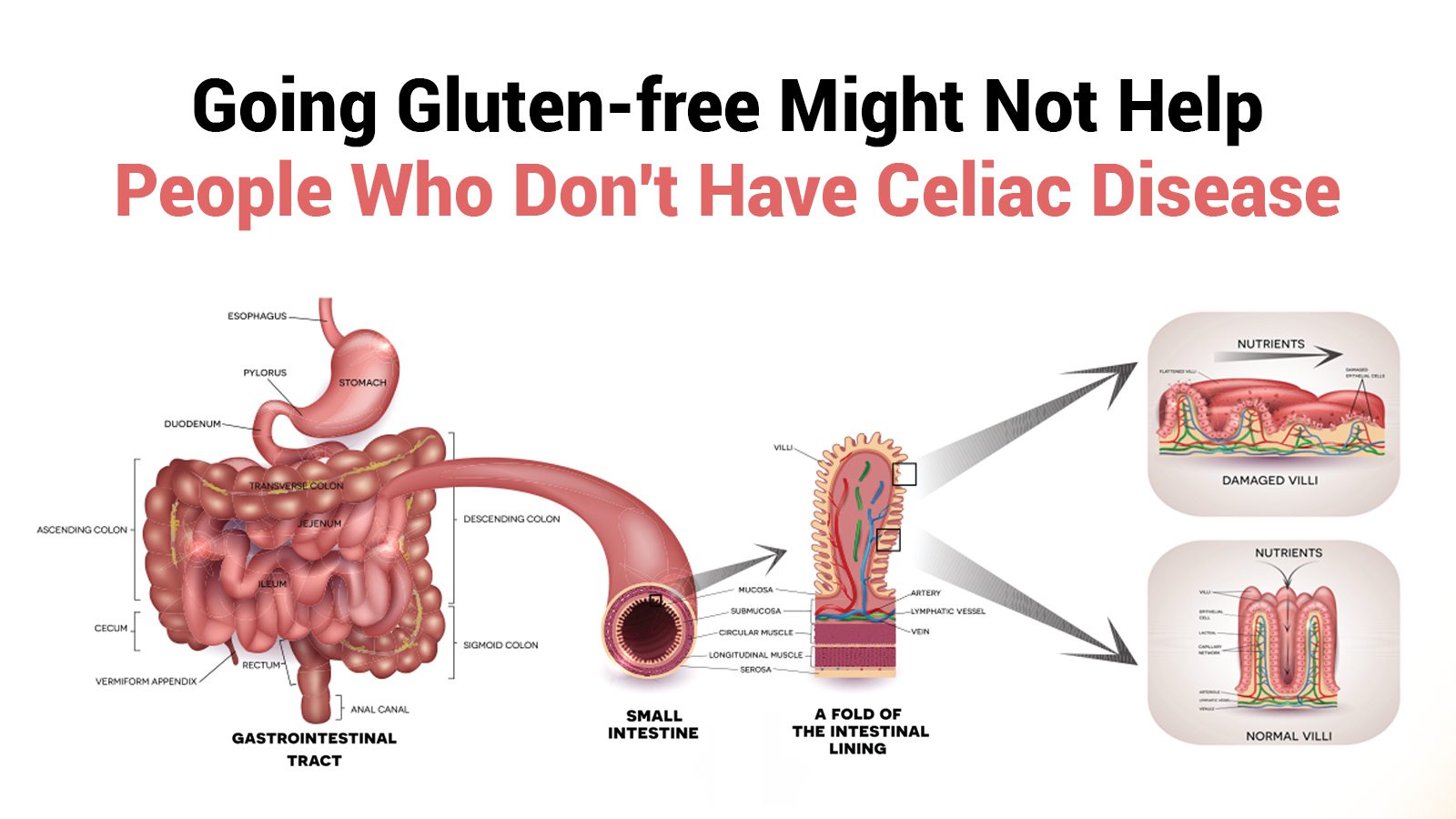A recent study found that going gluten-free doesn’t benefit people without celiac disease.
The study published on May 21st, 2021, by JAMA Network Open also found that women without celiac don’t experience a cognitive decline from eating gluten.
Women in their 50s and 60s who ate the highest amounts of gluten still performed well on cognitive tasks. They scored similarly on cognitive tests to women who ate lower amounts of gluten.
Study co-author Dr. Andrew T. Chan told United Press International (UPI) that people without celiac didn’t improve cognitive function on a low-gluten diet.
“This is in contrast to some … popular press that gluten was harmful and could contribute to cognitive decline or so-called ‘brain fog,'” said Chan, a professor at Harvard Medical School and a gastroenterologist at Massachusetts General Hospital in Boston.
Most people in the U.S. consume gluten in their diets. It’s commonly found in foods containing wheat, barley, rye, and other grains. In people with celiac disease, gluten has been linked to a heightened risk of cognitive impairment, according to Chan and his colleagues.
Celiac disease affects approximately 1% of the U.S. population. For people with this condition, gluten triggers a severe immune response which can cause damage to the small intestine. This makes foods with gluten difficult to digest, so they must follow a gluten-free diet.
Celiac disease can also cause multiple neuropsychiatric symptoms because of the heightened immune response. Some people experience cognitive impairment, depression, and anxiety, according to Chan and his colleagues. They added that it’s unclear whether the protein triggers the same response in those without celiac disease.
The study showing gluten-free diets don’t benefit those without celiac disease.
For this study, the researchers recorded the daily gluten consumption of nearly 13,500 women in their 50s and 60s. They did not have a history of celiac disease or its symptoms. The study tracked the participants’ gluten intake over the course of 25 years. It tested their cognitive function at the study’s conclusion and compared these scores for women with the highest gluten intake to those with the lowest.The study authors determined from the data that long-term gluten consumption didn’t affect cognitive function in middle-aged women without celiac disease. Chan said,
“People without a history of celiac disease should not modify their gluten intake under the belief that it will somehow prevent cognitive decline.”
He added that the evidence doesn’t support going gluten-free for those with no history or diagnosis of celiac disease.
However, there’s a huge financial incentive for companies selling gluten-free foods to continue pushing the diet on customers. According to Harvard University, the gluten-free food industry grew a whopping 136% between 2013 and 2015, with nearly $12 billion in sales in 2015. Interestingly, the researchers discovered that most people buying these products didn’t have celiac disease.
While gluten-free companies tout their products as beneficial to health, studies show the opposite is true. For people without celiac disease, going gluten-free may increase the risk of developing obesity and metabolic syndrome. Doctors describe this as a cluster of biochemical and physiological abnormalities that increase heart disease, Type 2 diabetes, and stroke risk. Research shows that people without celiac may experience weight gain due to improved nutrient absorption.
However, processed gluten-free foods often contain lower fiber and nutrient quality. They also tend to have more refined sugars, saturated fats, and a higher glycemic index. All of these factors can increase the risk of disease when people without celiac eat gluten-free products.
Going gluten-free isn’t necessary for health for those who do not have Celiac disease.
Unless you have celiac disease, there’s no real benefit to consuming gluten-free foods. In fact, it may actually lead to worse health down the road. Clinical nutritionist Samantha Heller analyzed the study results and agreed with the authors’ findings. She says that gluten won’t cause brain rot, despite what the gluten-free food industry claims.
There’s a lot of fear-mongering and misinformation on gluten out there, but it doesn’t poison the brain. People who don’t have celiac or a wheat allergy can eat gluten without fearing negative health consequences. Gluten will not cause brain inflammation, cognitive decline, or gut issues in people without celiac disease.
However, other preventable diseases such as heart disease, type 2 diabetes, and obesity can lead to cognitive problems, according to Heller. For example, Type 2 diabetes almost doubles the risk of dementia. Also, studies have found that heart disease leads to a 45% increase in impaired cognition. According to Heller, overweight or obese people have a higher risk of developing Alzheimer’s disease and dementia.
She added that, instead of pushing misinformation, we should focus on improving our overall health. Doing what we can to prevent disease will boost brain function, and it doesn’t require going gluten-free.
Here are a few common practices to maintain health and well-being:
- Make sure to exercise daily, doing something you enjoy. It will make it easier to work out if you actually like the activity.
- Eat more vegetables with your meals. Countries with the longest-living people eat mostly veggies and consider meat a complement to their meals.
- Include fresh fruits in your diet as well, along with more whole grain products. Foods like 100% whole wheat bread, multigrain cereals, oats, and barley are healthy choices.
- Avoid vegetable oils, as they’re more refined and can actually lead to heart problems. Choose extra virgin olive oil, avocado oil, or butter instead.
- Consume processed animal proteins, like lunch meats and sausage, sparingly or avoid them altogether. These have been linked to a higher risk of cancer and heart problems. If you’re a meat-eater, choose fresh cuts of meat that haven’t been smoked or processed.
- Drink plenty of water or herbal teas to stay hydrated. Avoid drinking excess caffeine or sugary beverages.
Final thoughts about a study showing that going gluten-free does not improve health in those without celiac
Despite the gluten-free food industry advertises, following this diet doesn’t make sense for those without celiac. If you’ve been sucked into the gluten-free trap, we hope this study will ease your fears about gluten. You can safely eat products with gluten as long as you don’t have celiac disease or a wheat allergy. You’ll save money, too, as gluten-free products are 242% more expensive than regular products, on average!
















 Community
Community

